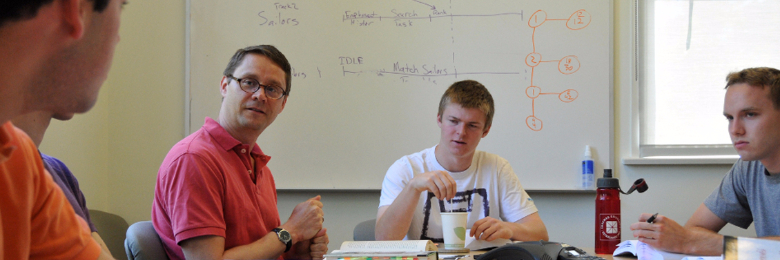
»Our Mission
The Smith Institute's broad mission is
-
to reintegrate the study of the humanities and economics in the spirit of Adam Smith, the author of The Theory of Moral Sentiments and An Inquiry into the Nature and Causes of the Wealth of Nations, and
-
to recombine research and undergraduate education as a discovery process in the spirit of Vernon Smith, the progenitor of experimental economics.
Vision
The Smith Institute for Political Economy and Philosophy at Chapman University is an intellectual community rooted in freedom of expression as undergraduate students, post-doctoral fellows, and faculty explore economics through the lens of the humanities and humanity through the lens of economics. The Smith Institute’s flagship program, humanomics, is dedicated to studying simultaneously the human condition and the causes and consequences of prosperity in the past 200 years.
The core courses are co-taught and cross-listed with professors from different disciplines and with texts from both disciplines read concurrently. Using Socratic dialogue, the professors’ job is to explore and learn alongside the students, rigorously teaching them how to ask good questions in an attempt to go beyond expected answers, modeling the importance of asking good questions in an academic pursuit.
The teaching in Humanomics is not personalized to the student, or for the student; rather, Humanomics is personalized by the student who explores his or her own questions about prosperity and the human condition. This sustained inquiry as part of a community of scholars is central to the learning environment. The goal of the program is not only to blur disciplinary lines but also the line between teaching and research, because teaching—like research—is about discovery.
History
The Smith Institute's interdisciplinary exploration has gained depth and momentum since 2010. The first phase of Humanomics was the First-year Foundation Course (FFC), “Humanomics: Exchange and the Human Condition,” which grew out of an extended discussion of the fundamental disconnect between scholars in the humanities and economics. At the core of the FFC course is the concurrent reading of texts from Economics and English, co-taught by Jan Osborn in the Department of English and Bart Wilson in the Economic Science Institute.
The three guiding questions of the first-year seminar course are What makes a rich nation rich? What makes a good person good? And what do these questions have to do with one another? While exploring these and other questions about markets and ethics, students will challenge the perception of economics as distinct from the humanities. This course combines an economic inquiry into the human propensity to exchange with the cultural interpretation of the human condition in novels, short stories, poems, and films. The instructional methods include Socratic roundtable discussions of the texts, laboratory experiments, journaling, focused free writes, and four expository papers/short stories.
Offered each fall since 2010 and awarded the 2011-2012 Pedagogical Innovation Award, Humanomics has grown, at the request of students, beyond a freshman course. The Presidential Seminar is a question-based Socratic Seminar where novels and economics and philosophy texts are read concurrently to continue the content and pedagogy of the FFC. Offered every semester since Fall 2011, the participating students represent all four years of Humanomics: Exchange and the Human Condition.